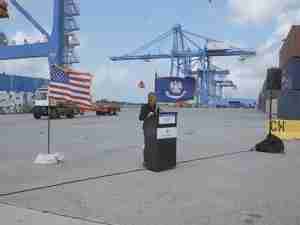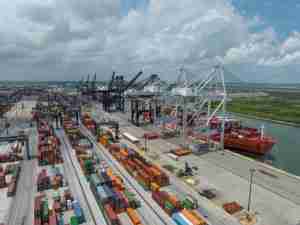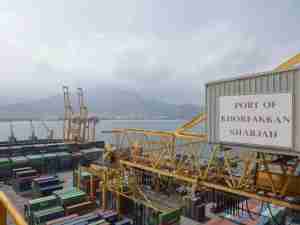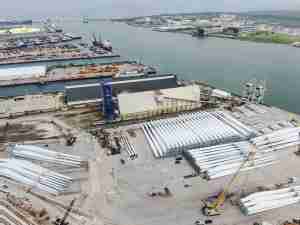Two Males Born at the Cove, Marking First Eagle Hatchlings Since 2007 Restoration
BALTIMORE, MD – The Masonville Cove Environmental Education Center campus has fully reopened after temporary restrictions to protect of a pair of nesting bald eagles were lifted this month. The bald eagles, which welcomed two male eaglets that were visible in May, were the first nesting pair at Masonville Cove since environmental restoration efforts began in 2007. The pair likely nested later than most, as the typical window for hatching is mid-March.
Both eaglets, which were banded by U.S. Fish & Wildlife Service (USFWS), successfully fledged in early July, allowing the campus to fully reopen. Letters and numbers on the bands identify the birds; a purple band signifies that the eaglets were hatched in the Chesapeake Bay watershed. The bands will allow scientists to track the eaglets throughout their life span.
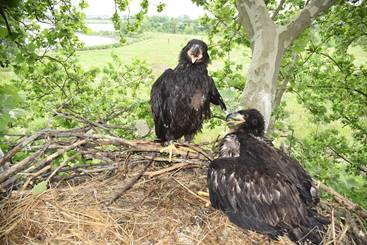
“The Port of Baltimore is excited to see what’s in store for Masonville Cove’s new family of bald eagles,” said Kristen Fidler, director of the Maryland Department of Transportation Maryland Port Administration (MDOT MPA) Office of Harbor Development. “The successful nesting season that brought two healthy eaglets to the cove signals the incredible recovery of Masonville since restoration efforts began in 2007. The Port is thankful for its partners, including the U.S. Fish & Wildlife Service, Maryland Environmental Service, Living Classrooms Foundation and National Aquarium for making Masonville Cove such a welcoming place for both people and animals.”
To protect the eagle family and their nest, restrictions were imposed on all activities within a 660-foot radius of the nest beginning in March. Since then, the pair has been monitored closely by the U.S. Fish & Wildlife Service (USFWS), Living Classrooms Foundation and Maryland Environmental Service.
The public is invited to visit Masonville Cove to see the campus’ newest arrivals. Visitors are asked not to approach the eagles closely. If they appear nervous or fly to a different area, please do not follow. Masonville Cove, 1000 Frankfurst Ave., Baltimore, is open to the public 9 a.m. to 4 p.m. Monday through Friday, and 9 a.m. to 1 p.m. Saturday, with extended hours on the first Thursday of the month until 8 p.m. For up-to-date information about the cove, call the Education Center at 410-246-0669.
Since 2007, some 230 bird species have been recorded at Masonville, making it No. 3 on the Baltimore eBird list of “hot spots.” At last month’s BioBlitz, an all-day event at the cove involving scientists, students, teachers and volunteers, 217 plant and animal species were identified. Since August 2018, birders have recorded 10 species previously unseen at Masonville, according to MES Senior Environmental Specialist Tim Carney.
Located along the banks of the Middle Branch of the Patapsco River, Masonville Cove is an urban wildlife area that was transformed from the former home of Kurt Iron and Metal and the Maryland Shipbuilding and Drydock Company. More than 61,000 tons of trash and debris dating back to the Great Baltimore Fire of 1904 have been cleared from the site.
In 2013, the USFWS designated Masonville Cove as the nation’s first Urban Wildlife Refuge Partnership. Today, the nationally-recognized refuge includes walking trails, a fishing pier and the Masonville Cove Environmental Education Center, which is marking its 10th anniversary in 2019. The Living Classrooms Foundation and National Aquarium provide educational and environmental programs at the center that are attended by about 2,000 students annually.
Among the nation’s ports, the Port of Baltimore ranks first for autos and light trucks, roll on/roll off heavy farm and construction machinery and imported sugar, and second in exported coal. Overall, the Port ranks ninth among all ports for the total dollar value of cargo and 12th in foreign cargo tonnage. Business at the Port generates more than 15,300 direct jobs, with more than overall 139,000 jobs in Maryland linked to Port activities. The Port is responsible for $3.3 billion in personal income and nearly $400 million in state and local tax revenues.
